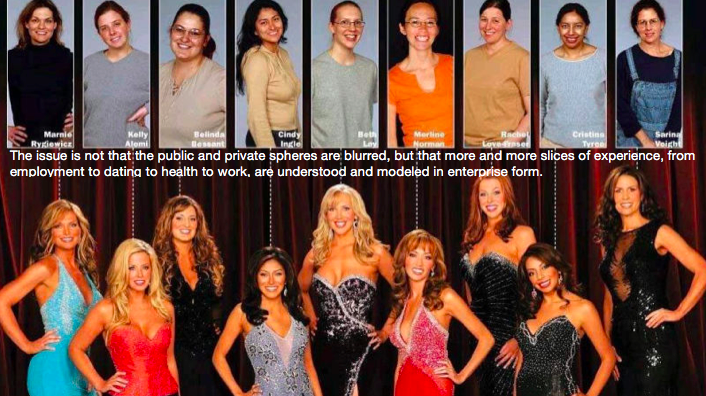Ouellette Reading

In Reality Television and Human Capital, Ouellette discusses the concept of homo economicus and how that translates into modern reality TV. She uses examples from a plethora of successful reality shows such as Tough Love, Top Chef, Project Runway, the Apprentice, and America’s Next Top Model that are competition shows where the unpaid contestants are trying to win something, whether it is the competition or to change themselves for the “better.” These shows take experiences of life that are not typically televised, such as trying to find a romantic partner or break into the competitive fashion modeling world, as a sort of commodity. A quote that stood out to me was, “The issue is not that the public and private spheres are blurred, but that more and more slices of experience, from employment to dating to health to work, are understood and modeled in enterprise form,” (Ouellette, 100). These reality shows capitalize on an idea of “self help” and competition to break into industries or “win” a mate, which artificially blows up these human experiences and turns them into commodities. A reality show that came to mind is The Swan, a 2004 show where women go through a series of plastic surgeries and other “self-help” processes to increase their attractiveness. This show was quite controversial, of course. The image I chose is a before and after of the “swans”—regular women who submit themselves to these extreme procedures to finally become “beautiful.” The producers of this show have turned this “self-help” idea and made it into a profitable enterprise that relies on viewers who are intrigued by the ridiculousness of the concept. The theme song to America’s Next Top Model also fit into this idea, in that the lyrics are just repetitions of “You wanna be on top? It’s time to make it hot, You know that we don’t stop, And when you get it hot, You’ve got to be on top.” This theme song reinforces the idea of “self-help” and “self-improvement” and tries to attract an audience who will be enticed by the glamour, thus bringing in money to the producers.